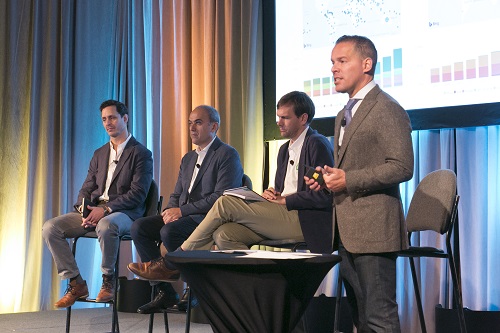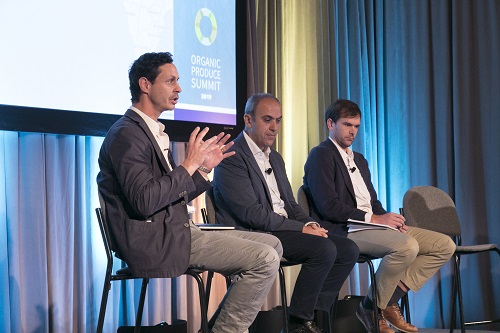The second of the Organic Produce Summit’s educational sessions on global organic trade focused on insights from leading organic fresh produce producers and marketers from across the globe.
Moderated by Jose Rossignoli, vice president of global sourcing for Robinson Fresh, he said the “regular” food category is only growing at three percent annually compared to double-digit growth for organic. “The data isn’t perfect because not all countries are tracking organic, but the current global farmland in organic production will not meet the rising demand in the future. This offers a massive opportunity for growers,” he said.
 (from left to right) Ignacio Donoso, Kiko Claros, Marcos Enchenique Walker, Jose Rossignoli
(from left to right) Ignacio Donoso, Kiko Claros, Marcos Enchenique Walker, Jose Rossignoli
Ignacio Donoso, director of new business development and offshore offices at Verfrut, agreed with Rossignoli. “In Chile, we export over 9000 containers and we are a vertically integrated company. Our introduction to organic was led by supply opportunities. For example, we began production in Peru and are now the biggest organic grape grower there,” he said.
The company has since ventured into organic bananas which presents only one percent of their total business - 15 containers per week – but Donoso said “EU retailers are excited and are urging us to grow organic lemons, limes and blueberries which will allow us to market in the same channels.”

Kiko Claros, CEO of Eurofresh, is a third-generation organic farmer. His grandfather planted the very first commercial avocado groves in Spain. “We have always been one hundred percent organic because when my grandfather began the word “organic” didn’t exist. He used traditional methods and was able to certify to organic,” Claros said.
In order to enhance their entire supply chain that began in Spain, they are now producing in the Dominican Republic, Columbia, Peru and Morocco. “We are now supplying the entire EU market with year-round organic avocados,” he said.
 (from left to right) Ignacio Donoso, Kiko Claros, Marcos Enchenique Walker
(from left to right) Ignacio Donoso, Kiko Claros, Marcos Enchenique Walker
Marcos Echenique Walker, market manager at Copefrut, said the company got into organic production because of many market changes. “We had to rethink the future. Copefrut makes decisions based on expectations of our consumers. They want to know where the fruit is coming from and what practices we use to produce our fruit,” he said. “However, organic is not for every item or every variety. We select the best areas, producers and varieties to produce our organic yields.”
All three panelists said the reasons they entered organic market are varied. Access to virgin land, demand for organic fruit and capitalization were all factors. Historical cultural practices also played a role.
Rossignoli said a packaging strategy is an important component of global organic marketing, with Claros saying different rules throughout the EU complicate issues. “Some counties have no difference in packaging requirements between organic and conventional. Others require that organic must be packaged. The Germans want no packaging and the lowest prices,” Claros said.
Copefrut’s Walker said it is important to maintain a balance of government and industry packaging requirements while maintaining the integrity of the product. Reduction of food waste is now an issue and as an industry “we need to take the lead on sustainable packaging and take care of that packaging through the end of its life cycle.”
The panelists reached consensus that organic volumes are growing and the recruitment for more organic producers is needed. Their aspirations are finding new categories of organic to supply the global market.






